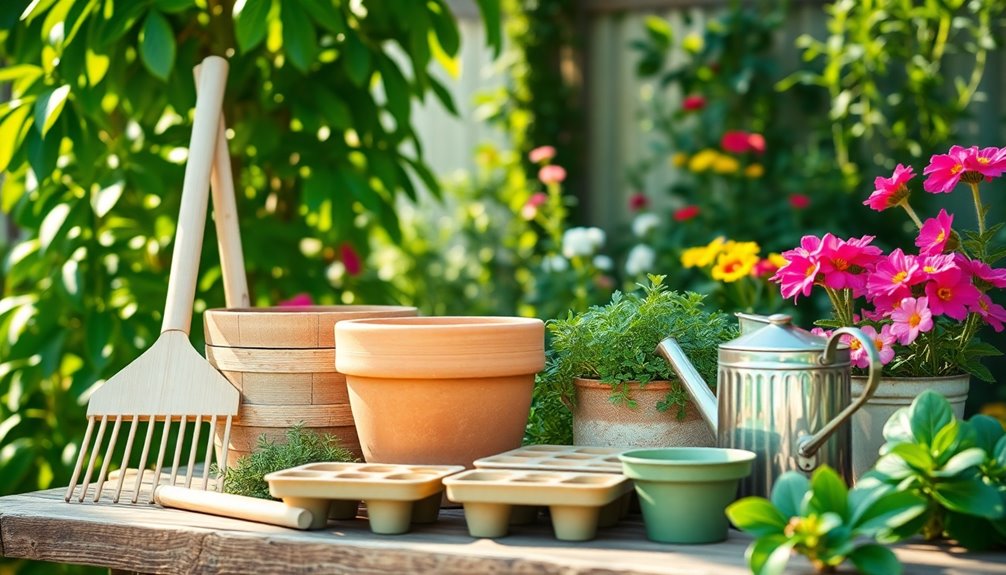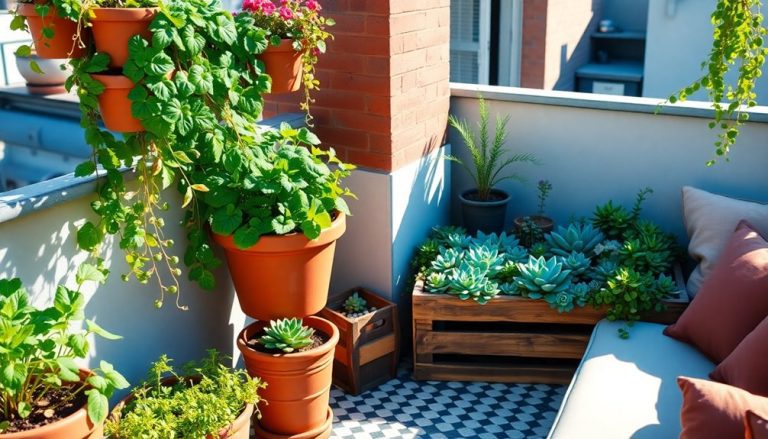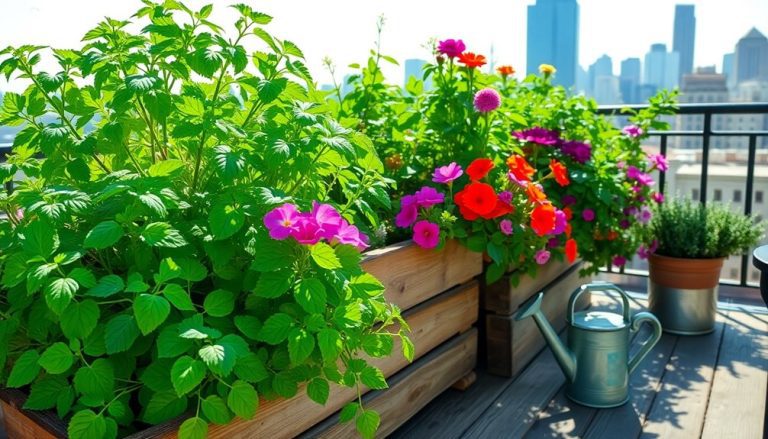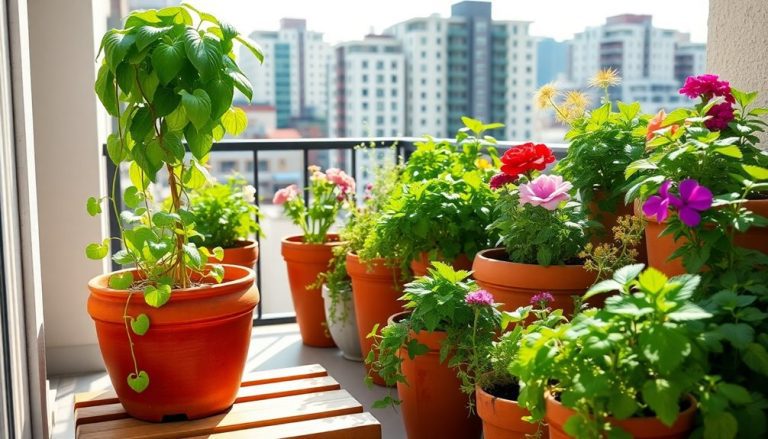You can transform your garden into an eco-friendly haven with the right tools designed for sustainable gardening. Start with organic gardening tools made from sustainable materials like bamboo and recycled metals. Add in composting tools for managing kitchen scraps and yard waste efficiently. Consider solar-powered equipment to cut down on energy use, like solar water pumps and lawn mowers. Water-saving irrigation systems, such as drip irrigation and rain barrels, help conserve water. Plus, investing in biodegradable plant pots and recycled hand tools makes a difference. Discover even more options that can elevate your sustainable gardening efforts!
Key Takeaways
- Organic gardening tools made from sustainable materials like wood and bamboo minimize environmental impact while enhancing comfort and control during gardening tasks.
- Recycled gardening tools, such as trowels and pruners, support a circular economy and reduce waste without compromising performance.
- Composting tools, including bins and aerators, help manage organic waste and enrich soil health, promoting sustainable gardening practices.
- Efficient irrigation systems like drip irrigation and rain barrels conserve water, reducing waste and ensuring plants receive adequate moisture.
- Solar-powered garden equipment, such as water pumps and lawn mowers, cuts emissions and energy costs, promoting eco-friendly gardening solutions.
Organic Gardening Tools
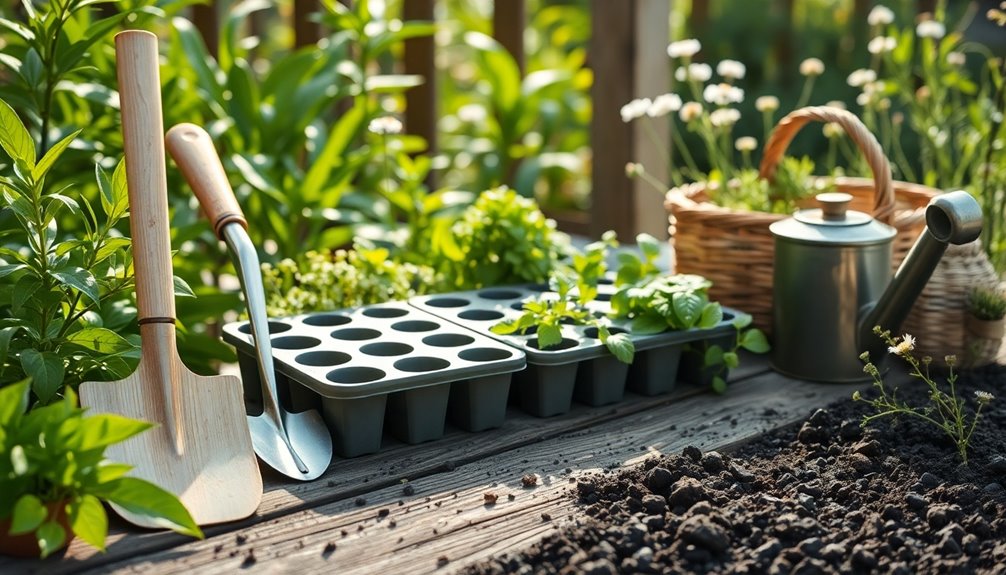
When you choose organic gardening tools, you're not just enhancing your garden; you're also supporting a healthier planet. Organic tools often come from sustainable materials like wood, bamboo, or recycled metals, reducing the carbon footprint associated with manufacturing. Additionally, opting for these tools helps promote the use of eco-friendly practices that can have a lasting impact on the environment.
By opting for these tools, you're making a conscious choice to minimize toxic chemicals and pollution, which can harm both your garden and the environment.
You'll find that organic gardening tools, such as hand trowels, hoes, and spades, provide the same efficiency as conventional tools without the negative impact. Many of these tools are ergonomically designed, giving you better control and comfort while you work.
Plus, they're often more durable, meaning they'll last longer and save you money in the long run.
Another vital aspect of organic tools is their safety. Since they're made without harmful substances, you can feel good about using them around your children and pets.
Remember, every time you use an organic tool, you're fostering biodiversity in your garden and contributing to the ecological balance. Additionally, using tools like pruning shears can help maintain healthy plant growth by promoting better air circulation and sunlight penetration.
Solar-Powered Garden Equipment
Harnessing the sun's energy with solar-powered garden equipment can transform the way you maintain your outdoor space. These tools not only reduce your carbon footprint but also save you money on electricity. Imagine using a solar-powered water pump that efficiently irrigates your garden, or a solar-powered lawn mower that quietly keeps your grass trimmed without the noise or emissions of traditional mowers. Additionally, incorporating solar lighting solutions can enhance the beauty and safety of your garden during the evening hours. Adding solar-powered water features can create a serene atmosphere while further utilizing renewable energy.
Here's a quick overview of some popular solar-powered garden tools:
| Equipment | Benefits | Considerations |
|---|---|---|
| Solar Water Pump | Efficient irrigation, low maintenance | Initial cost can be higher |
| Solar Lawn Mower | Quiet operation, no emissions | Battery life may limit range |
| Solar Garden Lights | Enhances garden aesthetics, energy-saving | May require sunny location |
| Solar Pest Repeller | Eco-friendly pest control | Effectiveness varies by environment |
| Solar Soil Moisture Sensor | Monitors soil health, saves water | May need regular cleaning |
Composting Tools
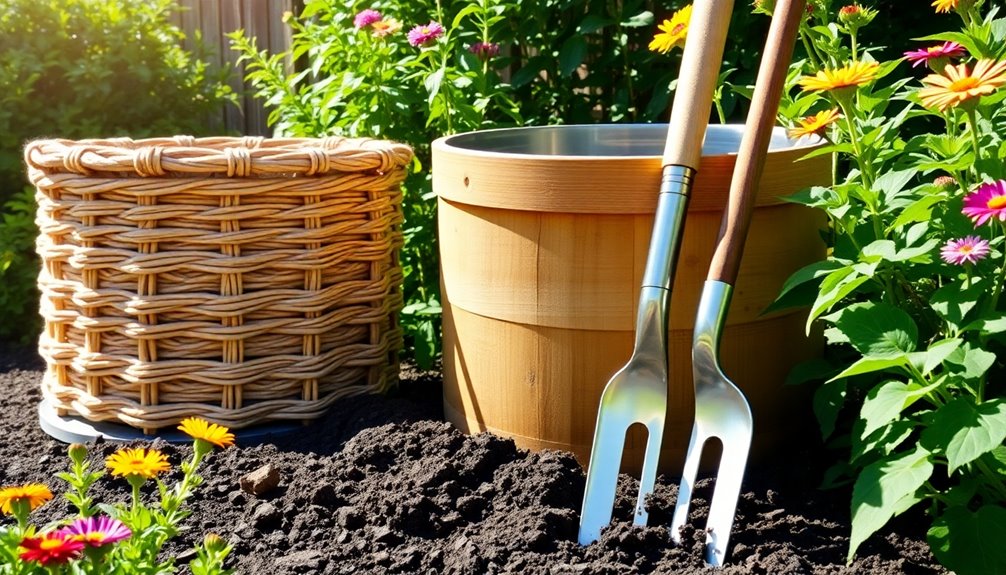
After optimizing your garden with solar-powered tools, it's time to think about how to enrich your soil sustainably. Composting is one of the best ways to enhance soil fertility while reducing waste.
To get started, invest in a compost bin or tumbler. These tools help you manage kitchen scraps and yard waste efficiently. A compost bin is great for static composting, while a tumbler allows for quicker decomposition with regular turning.
You'll also want a compost aerator. This handy tool mixes air into your compost, speeding up the breakdown process and preventing odors. If you prefer a hands-on approach, a pitchfork or shovel works well too; just remember to turn your pile regularly.
Don't forget to keep a kitchen compost container handy for collecting scraps like vegetable peels, eggshells, and coffee grounds. This makes it easy to gather waste before transferring it to your compost bin. Additionally, choosing the right compost bin products can further enhance your composting experience.
Eco-Friendly Pest Control
Implementing eco-friendly pest control methods can significantly benefit your garden while protecting the environment. Instead of reaching for harsh chemicals, consider using natural solutions that are effective and safe for your plants, pets, and the surrounding ecosystem.
Start by attracting beneficial insects like ladybugs and lacewings, which naturally prey on common pests. You can create a welcoming habitat for them by planting a variety of flowers and herbs, such as marigolds and dill.
Additionally, consider using companion planting techniques; for example, planting garlic near your roses can deter aphids.
Another option is to use homemade sprays. A simple mixture of water, dish soap, and a few drops of essential oils can help control unwanted insects. Neem oil is another great natural pesticide that disrupts the life cycle of pests without harming beneficial insects when applied correctly.
Finally, regularly monitoring your plants and maintaining healthy soil can greatly reduce pest problems. Healthy plants are more resilient and less susceptible to infestations.
Water-Saving Irrigation Systems
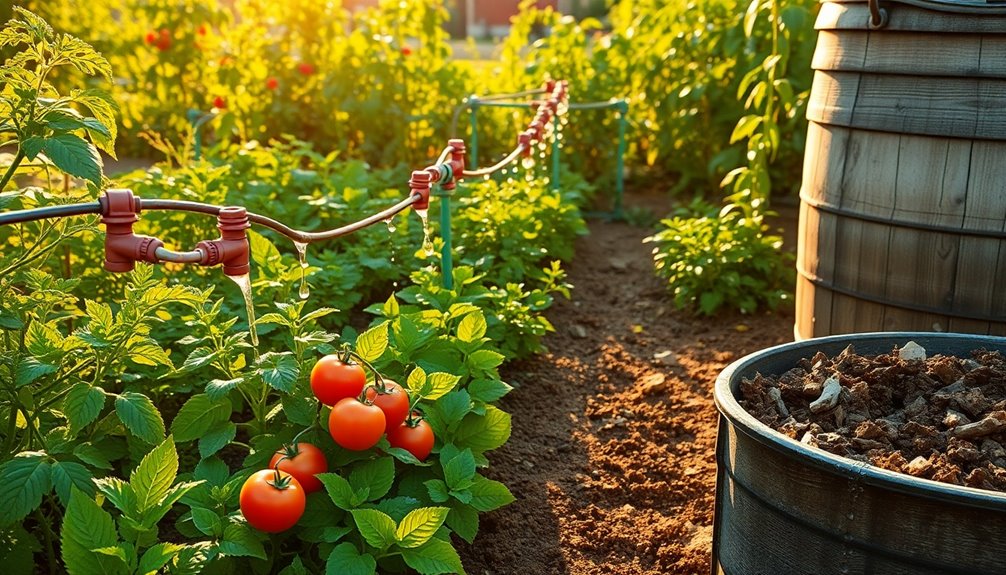
As water scarcity becomes an increasing concern, adopting water-saving irrigation systems can make a significant difference in your garden's sustainability.
These systems not only conserve water but also ensure your plants receive the right amount of moisture they need to thrive.
One effective option is drip irrigation, which delivers water directly to the roots of your plants. This method minimizes evaporation and runoff, allowing you to use up to 60% less water compared to traditional sprinklers.
Installing a rain barrel is another great idea; it collects rainwater from your roof, providing a free, eco-friendly water source for your garden.
Consider using a smart irrigation controller, too. These devices adjust watering schedules based on weather conditions and soil moisture, preventing overwatering and saving you time and money.
Additionally, mulching around your plants helps retain soil moisture, further reducing the need for frequent watering.
Biodegradable Plant Pots
When you're looking to make your gardening practices more sustainable, biodegradable plant pots are a fantastic option. These pots break down naturally over time, reducing plastic waste in landfills and promoting healthier soil. They're made from materials like peat, coconut coir, or recycled paper, and they offer a gentle transition for your plants as they grow.
Here's a quick comparison of some popular biodegradable pot options:
| Pot Type | Benefits |
|---|---|
| Peat Pots | Lightweight, excellent drainage |
| Coconut Coir Pots | Retain moisture, eco-friendly |
| Paper Pots | Fully compostable, easy to handle |
Using biodegradable pots means you won't need to worry about disturbing your plants when it's time to transplant them. They can be planted directly into the ground, allowing roots to grow freely and promoting overall plant health. Plus, they're often more affordable than traditional plastic pots, giving you a win-win situation. So, if you're committed to eco-friendly gardening, consider making the switch to biodegradable plant pots for a greener thumb!
Hand Tools Made From Recycled Materials
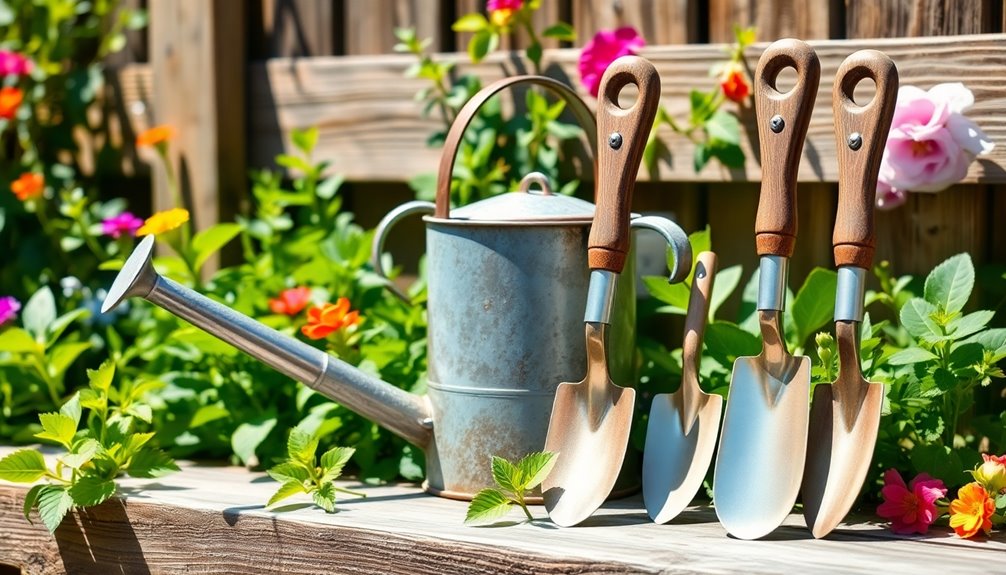
Switching to biodegradable plant pots is just one of many steps you can take toward sustainable gardening.
Another impactful choice is using hand tools made from recycled materials. These tools not only help reduce waste but also promote a circular economy, which is vital for environmental health.
When you opt for tools crafted from recycled metals or plastics, you're supporting manufacturers who prioritize sustainability. Look for trowels, pruners, and rakes that feature handles made from repurposed materials. They often perform just as well as traditional tools but come with the added benefit of being eco-friendly.
Additionally, using these recycled tools can inspire others in your community to make more sustainable choices. It's a simple yet effective way to spread awareness about the importance of reducing waste in gardening.
Check local garden centers or online retailers for options that showcase recycled materials. You might be surprised at the variety available, from sturdy shovels to ergonomic weeders.
Natural Mulching Options
For a greener garden, consider natural mulching options that not only enhance your plants' health but also enrich the soil. Organic materials like straw, grass clippings, and shredded leaves are excellent choices. They break down over time, adding nutrients back into the earth while suppressing weeds and retaining moisture.
When using straw, make sure it's free from seeds to prevent unwanted growth. Grass clippings can be a great resource, but don't apply them too thickly or they may mat together, blocking water and air.
Shredded leaves are another fantastic option; they're not just free but also readily available in the fall. You might also explore wood chips or bark. They provide a rustic look and last longer than softer materials, making them a good choice for paths and around trees.
Just be cautious about using fresh wood chips, as they can tie up nitrogen as they decompose. Lastly, consider using cardboard or newspaper as a base layer under your mulch. This method helps smother weeds while the organic mulch breaks down above it.
Sustainable Garden Furniture
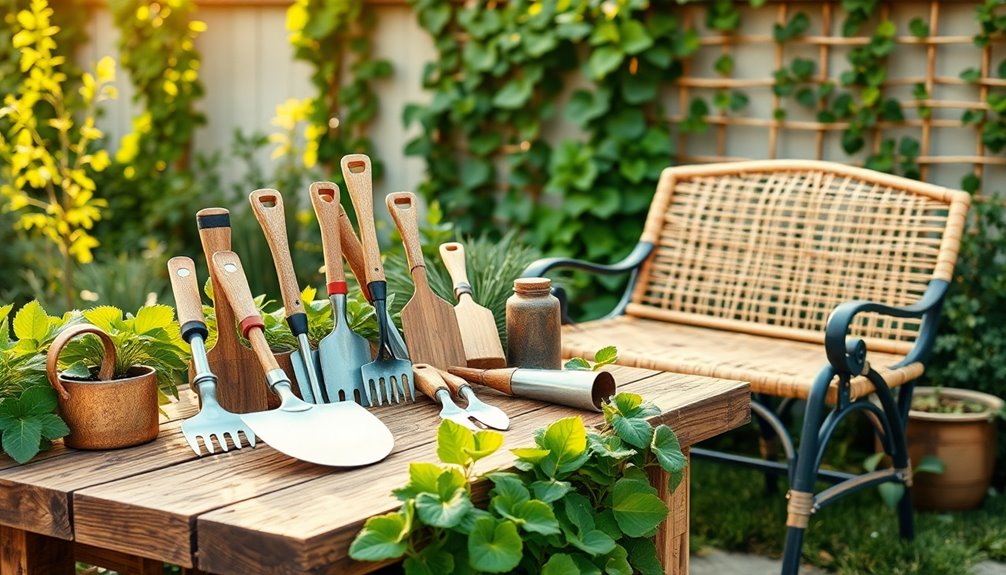
Enhancing your garden isn't just about plants and soil; the furniture you choose can also reflect your commitment to sustainability. When selecting garden furniture, look for pieces made from reclaimed wood or sustainably sourced materials. Not only do these options reduce waste, but they also add a unique charm to your outdoor space.
Consider opting for furniture that's designed to withstand the elements, like aluminum or recycled plastic. These materials are durable and require less maintenance, reducing your need for harsh chemicals.
Additionally, choose items that are easily disassembled or repurposed, contributing to a circular economy.
Don't forget about comfort! Look for cushions made from organic fabrics or recycled materials, which aren't only eco-friendly but also provide a cozy spot to relax. When you invest in sustainable garden furniture, you're creating a space that's not only visually appealing but also environmentally responsible.
Finally, consider the longevity of your choices. By selecting high-quality, sustainable furniture, you'll enjoy your garden for years to come while minimizing your ecological footprint.
Make your outdoor oasis a testament to your sustainable lifestyle!
Frequently Asked Questions
How Can I Start a Sustainable Garden on a Budget?
To start a sustainable garden on a budget, you can repurpose materials, choose native plants, and practice companion planting. It's all about creativity and resourcefulness, making your garden thrive without breaking the bank.
What Are the Benefits of Organic Gardening for the Environment?
Organic gardening boosts biodiversity, improves soil health, and reduces pollution. You're fostering a healthier ecosystem, conserving water, and minimizing chemical use. Plus, you'll enjoy fresher, tastier produce while protecting the environment for future generations.
How Do I Know if My Tools Are Truly Eco-Friendly?
To know if your tools are eco-friendly, check for sustainable materials, certifications, and energy-efficient manufacturing processes. Research brands that prioritize environmental responsibility, and consider the tool's lifespan to minimize waste and promote sustainability.
Can I Make My Own Compost at Home?
Yes, you can definitely make your own compost at home! Just gather kitchen scraps, yard waste, and some soil. Layer them in a bin, turn it occasionally, and you'll have rich compost in a few months!
What Plants Are Best for Attracting Beneficial Insects?
To attract beneficial insects, you should plant native flowers like lavender, marigolds, and daisies. These plants provide nectar and pollen, creating a welcoming habitat for ladybugs, bees, and other helpful creatures in your garden.
Conclusion
Incorporating eco-friendly tools into your gardening routine is like planting seeds of change for the planet. Just as a single seed can grow into a flourishing tree, your small choices can lead to a healthier environment. For instance, using solar-powered equipment not only cuts down on emissions but also saves you money in the long run. By choosing sustainable options, you're nurturing a garden that not only thrives but also supports a thriving Earth for future generations.

